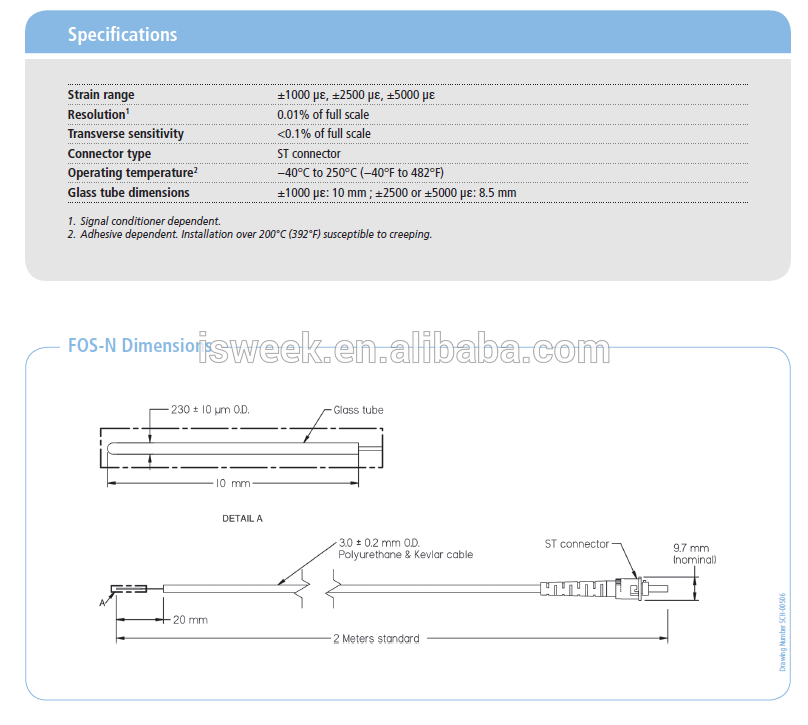
FOS-N Fiber Optic Strain Sensor
- Delivery Time:
- 7 Days
Quantity:
Your message must be between 20 to 2000 characters
Contact NowBasic Info
Basic Info
| Place of Origin: | Canada |
|---|
Product Description
Product Description
FOS-N Fiber Optic Strain Sensor Description The FOS-N is a fi ber optic strain sensor, ideal for composite material engineering
research and civil-engineering applications such as structural health
monitoring of buildings, bridges, tunnel linings and supports.
The FOS-N strain sensor offers small size, high accuracy, immunity to EMI/RFI, and
resistance to corrosive environments with a high temperature range.
Manufacturers, civil structure designers, and research engineers may now improve
structure technology by developing and testing composite materials in a range of
applications. The capability to monitor the performance of new materials and
structures is crucial to evaluate them objectively. Monitoring specifi c properties
over time will help improve the safety and durability of civil structures. The deployment
of sensors within a structure, whether it is a bridge or a dam, provides
accurate information on changes in strains in the structure. Monitoring stresses
in structural members of buildings, bridges, tunnel linings and supports during
and after construction is also possible with the FOS-N fi ber optic strain sensor.
The use of the FOS-N strain sensor allows a complete stress/strain analysis in the
most challenging environments.
Based on proven Fabry-Perot interferometer technology, FISO’s fi ber optic strain
sensors are the best choice for high performance strain measurements. The technology
upon which are based the FOS-N strain sensor and the compatible monitoring
system provide absolute strain measurements at very long distances without
affecting the reliability of the readings.
The FOS-N strain sensor is not sensitive to any pulling or manipulation of the incoming
fi ber. This feature is advantageous when the sensor is embedded into
com posite materials.
The FOS-N fi ber optic strain sensor withstands harsh chemical environments and
offers ruggedness and fl exibility for today’s high-performance composite material
research and civil structure monitoring requirements. Applications - Torque measurement
- New material research and development
- Civil engineering
- Tunnel linings
-Nuclear power plants
- Structural health monitoring
- Corrosive environments
- High EMI/RFI environments Key Features -Immune to EMI/RFI/lightning
- Intrinsically safe
- Static/dynamic response
- High sensitivity and resolution: 0.01% full scale
- Signal transmitted over long distances
- No interference due to cable bending
- Absolute measurements in engineering units
 Contact :
Contact : 
research and civil-engineering applications such as structural health
monitoring of buildings, bridges, tunnel linings and supports.
The FOS-N strain sensor offers small size, high accuracy, immunity to EMI/RFI, and
resistance to corrosive environments with a high temperature range.
Manufacturers, civil structure designers, and research engineers may now improve
structure technology by developing and testing composite materials in a range of
applications. The capability to monitor the performance of new materials and
structures is crucial to evaluate them objectively. Monitoring specifi c properties
over time will help improve the safety and durability of civil structures. The deployment
of sensors within a structure, whether it is a bridge or a dam, provides
accurate information on changes in strains in the structure. Monitoring stresses
in structural members of buildings, bridges, tunnel linings and supports during
and after construction is also possible with the FOS-N fi ber optic strain sensor.
The use of the FOS-N strain sensor allows a complete stress/strain analysis in the
most challenging environments.
Based on proven Fabry-Perot interferometer technology, FISO’s fi ber optic strain
sensors are the best choice for high performance strain measurements. The technology
upon which are based the FOS-N strain sensor and the compatible monitoring
system provide absolute strain measurements at very long distances without
affecting the reliability of the readings.
The FOS-N strain sensor is not sensitive to any pulling or manipulation of the incoming
fi ber. This feature is advantageous when the sensor is embedded into
com posite materials.
The FOS-N fi ber optic strain sensor withstands harsh chemical environments and
offers ruggedness and fl exibility for today’s high-performance composite material
research and civil structure monitoring requirements. Applications - Torque measurement
- New material research and development
- Civil engineering
- Tunnel linings
-Nuclear power plants
- Structural health monitoring
- Corrosive environments
- High EMI/RFI environments Key Features -Immune to EMI/RFI/lightning
- Intrinsically safe
- Static/dynamic response
- High sensitivity and resolution: 0.01% full scale
- Signal transmitted over long distances
- No interference due to cable bending
- Absolute measurements in engineering units

 Contact :
Contact : 
Related Keywords
Related Keywords
You May Also Like
You May Also Like










